Veneers in Northamptonshire
Search and Compare the Best Clinics and Doctors at the Lowest Prices for Veneers in Northamptonshire
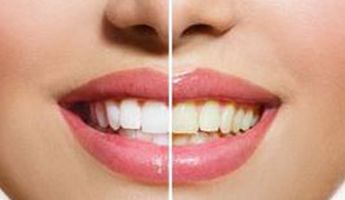
Find the best clinics for Veneers in Northamptonshire
With Medijump you can browse 2 facilities offering Veneers procedures in Northamptonshire. The cheapest price available is $319 in Greater London, West Midlands
Veneers in United Kingdom
Price: $ 319
Veneers in Greater London
Price: $ 319
Veneers in East Sussex
Price: $ 356
Vietnam offers the best prices Worldwide
Price: $ 1
Dr S Etemadi Dental Practice, can be found in Queens Park, Northamptonshire, United Kingdom and offers its patients Veneers procedures as well as 2 other procedures, across 1 different procedure categories. The price of a Veneers procedure starts from just £370, and the average price is around £514. A small team of medical professionals undertake all procedures at the Dental, with 3 in total, and Dr S Etemadi Dental Practice is accredited by just one known accreditations institute, GDC - General Dental Council
Daventry Dental, can be found in Daventry, Northamptonshire, United Kingdom and offers its patients Veneers procedures as well as 39 other procedures, across 4 different procedure categories. At present, there is no pricing information for Veneers procedures at Daventry Dental. The pricing information is quite specialised, so it's only available on request, and the average price is around $655. A small team of medical professionals undertake all procedures at the Dental, with 3 in total, and Daventry Dental has several accreditations, including: GDC - General Dental CouncilBDA - British Dental AssociationGDC - General Dental CouncilBDA - British Dental Association
- Home
- United Kingdom
- Northamptonshire
Compare Before & After Photos of _procedure_photos.phpVeneers
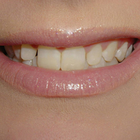
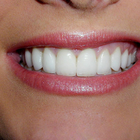
Front view
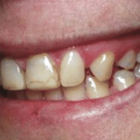
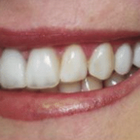
Half-side view
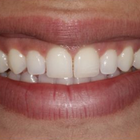
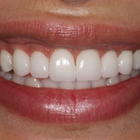
Front view
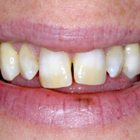
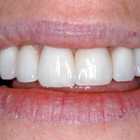
Front view
WHY US?
At Medijump, we're making medical easy. You can search, compare, discuss, and book your medical all in one place. We open the door to the best medical providers worldwide, saving you time and energy along the way, and it's all for FREE, no hidden fees, and no price markups guaranteed. So what are you waiting for?

Free

Best Price

Widest Selection

Risk-Free
What you need to know about Veneers in Northamptonshire

Dental veneers are thin covers that are attached to the surface of teeth to enhance their appearance. The non-invasive dentral procedure is previously popular among those with damaged or discolored teeth. Nowadays, however, the procedure is seen as the ideal method of achieving the ‘perfect smile.'
Veneers can be used to hide uneven, misaligned or simply imperfect teeth. The veneers are cemented over the existing teeth and fixed into place – there are two main types of veneer; Porcelain and Composite. Porcelain veneers are more expensive and appear more natural, being made in a laboratory so require multiple visits. There is often the need to alter the existing teeth, removing some of the mass. Composite veneers are made of the same materials used for cavity fillings. They can usually be made quickly, and are sculpted directly on the teeth instead of in a laboratory. Thus allowing the procedure to be done in a day.
What does a Veneers Procedure Involve?
Veneers are used primarily for aesthetics. This type of treatment procedure is perfect for people who have gaps in their teeth, stains, as well as people who may have chipped a tooth. Veneers are custom-made shells designed to fit the shape of your teeth and to be attached to your front teeth to improve the size, shape, color, and length.
Two main types of veneers are:
- Composite Veneer - this type can be created by your dentist on the same day and directly applied to your teeth. You will only need a single appointment to complete the procedure.
- Porcelain Veneer - this type is manufactured in a laboratory. Opting for a porcelain veneer will require you to have two appointments. First, is to prepare your teeth (enamel removal) and mold a model of your teeth to be created in the lab. The second is to finally cement your veneers onto your teeth.
The most commonly used type of Veneer is the Porcelain Veneer as it appears more natural and can resist stains better than composite veneers. Besides the two main types of veneers, some dentists may also offer no-prep veneers. These may include specific brands of procelain veneers like Vivaneers and Lumineers. They are less invasive to apply since the layers of tooth under the enamel aren't removed.
In terms of anesthetics, local anesthesia is not usually required while undergoing the whole procedure. However, depending on how you handle pain and discomfort, you may request to receive local anesthesia or sedation.
Aside from giving you a pleasing smile, veneers are resistant to staining and offer the best fix to broken or damaged teeth.
How Long Should I Stay in Northamptonshire for a Veneers Procedure?
This type of procedure is an outpatient treatment, meaning you may be able to go home after undergoing the procedure. However, you will be required to do a follow-up check-up with your dentist to assess the placement of your veneers and in most cases, the procedure has to be carried out over 2 separate occasions, just a day or two apart. Since this is a non-invasive treatment, stitches are not required, but you will be required to stay in Northamptonshire for at least a few days.
What's the Recovery Time for Veneers Procedures in Northamptonshire?
There is actually no recovery time after the placement of your veneers. You can also return back to your daily routines including exercise immediately after your trip. As for the enamel removal, you may experience some mild discomfort for about a week. It is best that you avoid very hot or cold foods, including hard, chewy or crunchy food. When your sensitivity wears off, you can return to your normal dietary habits.
What sort of Aftercare is Required for Veneers Procedures in Northamptonshire?
Once your dental veneers have been placed and you have completed the whole procedure, you should commit yourself to good oral hygiene, regular visits to your dentist and a good healthy lifestyle. Dental Veneers can last beyond 10 years now, however, just like your natural teeth, veneers are also still susceptible to damage. This is why aftercare is very important to help with the longevity of your new teeth.
What's the Success Rate of Veneers Procedures in Northamptonshire?
Over the past years, many studies have reported that over 91% of people who have had dental veneers experienced highly positive results. However, potential risks and side effects after undergoing this procedure are a possibility. Just like any other dental restoration, dental veneers can have some side-effects, for example:
- Tooth sensitivity - since this procedure will require the removal of some enamel, your teeth will become slightly sensitive, following the placement of your veneers.
- Response from gum tissues - your gum tissue might take some time to adjust to your newly placed veneers. Expect to have some minor inflammation and/or discomfort in your gums.
- Risk of trauma - once your teeth’s enamel is removed, it will become more sensitive, thus it will be even possible for the pulp within your teeth to die.
- Possible Issues with placement - it's possible for your teeth to have issues with decay or chipping along the outer portion of your veneers. Gum irritation may also be possible. Other problems may include rough-edged veneers and overhanging veneers.
- Overall Discomfort - experiencing some discomfort after the procedure is to be expected. If you are particularly sensitive, it is advisable that you take an over the counter medication to help you relax and treat your pain.
Are there Alternatives to Veneers Procedures in Northamptonshire?
You also have to be aware that this type of treatment option is not for everyone. If you are not a good candidate to undergo the procedure, note that there are still possible alternatives that will be suited for you. These alternatives may include:
Orthodontics - if you have severely crooked teeth or malocclusion, dental veneers are not for you. You may want to consider a more comprehensive orthodontic procedure to treat your case.
Dental crowns - these are quite similar to dental veneers. These are also custom-made to match the shape of your teeth. However, unlike veneers, a crown extends all the way around your tooth, meaning your dentist will remove a large portion of your dental structure. These crowns are perfect for patients who have considerable damage that affects the strength and structure of their teeth.
Bonding - often called composite veneers. This is typically for patients with an insufficient amount of tooth enamel.
Whilst the information presented here has been accurately sourced and verified by a medical professional for its accuracy, it is still advised to consult with your doctor before pursuing a medical treatment at one of the listed medical providers
No Time?
Tell us what you're looking for and we'll reachout to the top clinics all at once
Enquire Now

Popular Procedures in Northamptonshire
Prices Start From $1

Prices Start From $1

Prices Start From $48

Prices Start From $1

Prices Start From $1

Prices Start From $1

Prices Start From $11

Prices Start From $45

Recommended Medical Centers in Northamptonshire for Veneers

- Interpreter services
- Translation service
- Religious facilities
- Medical records transfer
- Medical travel insurance
- Health insurance coordination
- TV in the room
- Safe in the room
- Phone in the room
- Private rooms for patients available

- Interpreter services
- Translation service
- Religious facilities
- Medical records transfer
- Medical travel insurance
- Health insurance coordination
- TV in the room
- Safe in the room
- Phone in the room
- Private rooms for patients available

- Interpreter services
- Translation service
- Religious facilities
- Medical records transfer
- Medical travel insurance
- Health insurance coordination
- TV in the room
- Safe in the room
- Phone in the room
- Private rooms for patients available
Veneers in and around Northamptonshire
Popular Searches
- Plastic Surgery in Thailand
- Dental Implants in Thailand
- Hair Transplant in Thailand
- Breast Augmentation Thailand
- Gastric Sleeve in Thailand
- Gender Reassignment Surgery in Thailand
- Laser Hair Removal in Bangkok
- Botox in Bangkok
- Dermatology in Bangkok
- Breast Augmentation in Bangkok
- Coolsculpting in Bangkok
- Veneers in Turkey
- Hair Transplant in Turkey
- Rhinoplasty in Turkey
- Stem Cell Therapy in Mexico
- Rhinoplasty in Mexico
- Liposuction in Mexico
- Coolsculpting in Tijuana
- Rhinoplasty in Korea
- Scar Removal in Korea
- Gastric Sleeve in Turkey
- Bone Marrow Transplant in India
- Invisalign in Malaysia
- Plastic Surgery in the Dominican Republic
- Tummy Tuck in the Dominican Republic
- Plastic and Cosmetic Surgery in Poland
- Rhinoplasty in Poland
- Hair Implant in Poland
- Dental Implants in Poland
- IVF in Turkey

